Updates on Military Helicopter Crash: One Officer Confirmed Dead, Other Missing
January 27, 2020 - We already reported on the military helicopter crash that happened today near Zlarin, when a Kiowa helicopter crashed into the Adriatic sea midflight. Tonight we bring you the latest updates.
The Ministry of Defence reported the identities of the officers that were onboard the Kiowa Warrior OH-58Darrior OH-58D helicopter when it crashed near Zablaće on Monday.
Major Marin Klarin, a pilot in the Croatian Air Force, is confirmed to have died in the accident. The search is still ongoing for the other officer on board the helicopter, First Lieutenant Tomislav Baturina. Damir Krstičević, the Minister of Defence, Mirko Šundov, Chief of the General Staff of the Armed Forces of the Republic of Croatia, and the commander of the Croatian Air Force, Michael Križanec, visited the families of the pilots involved in the crash and expressed their condolences to the Klarin family.
The Kiowa helicopter wreck is now on the seabed, at a depth of thirty metres. Divers have been searching for the First Lieutenant throughout the entire afternoon, and the search and rescue operation will continue tomorrow.
At a press conference, it was explained that nothing seemed odd during the training flight before the Kiowa crashed. Fishermen immediately managed to get to Major Klarin's body after the helicopter crash, but they weren't able to revive him.
The entire squadron of Kiowa helicopters has been grounded until the cause of the accident has been determined, although it was also said at the conference that the helicopter that crashed was among the newest in the squadron and was fully operational.
Popovac on Tour: Baranja School Fighting Plastic Pollution in Turkey
Students from Popovac Primary School have just returned from a week in Manavgat, a town in the south of Turkey, where they participated in the third of four mobilities of the Erasmus+ project „Kids Against Plastic Pollution“.
On January 12th, 2020, Dorian Hranić, Dora Knez, Mateo Koprivec, Ema Rudnički, Leonora Vereš and Patrik Štainer, accompanied by teachers Goran Podunavc and Suzana Vencl, arrived in sun-kissed Antalya to continue their fight against plastic pollution with new friends from Turkey, Norway and Romania.
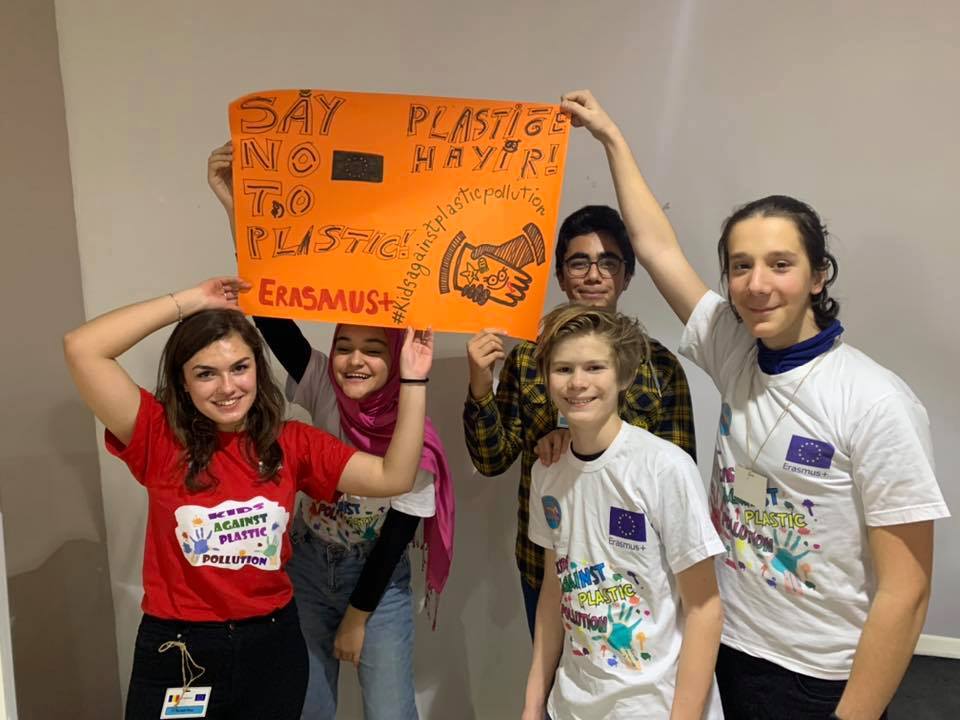
The host organizers prepared a program full of interesting activities. First, students learned how to make a successful campaign against plastic pollution. In international groups, they then made posters which they used to attract the attention of passengers during the beach cleaning later in the with. Using their own examples, the students showed that each change starts within each of us. The students also heard from the governor of Manavgat, who spoke about what the town does when it comes to the problem of plastic pollution.
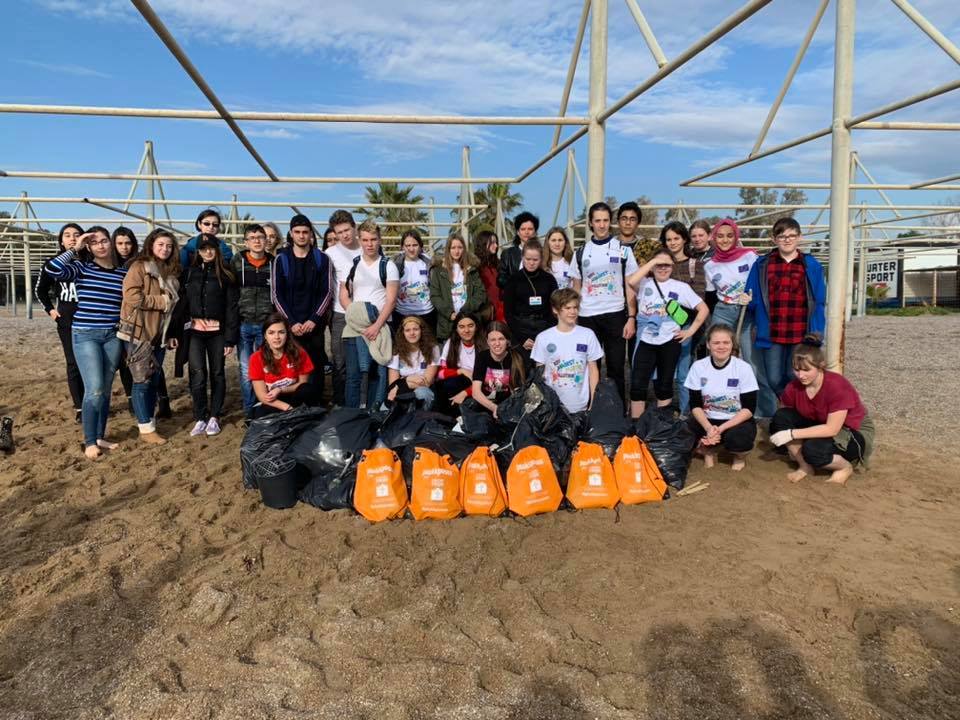
With slogans and drawings on posters, the students pointed on the problem of plastic pollution and on the need for action from all of us when it comes to saving nature. During a visit to one of the wastewater treatment plants in the town, they heard shocking facts regarding the most common plastic objects that wind up in the sewage. During the summer the population of 300 hundred citizens in Manavgat grows to one million. Irresponsible guests are the ones who mostly throw wet towels in toilets and since they are non-degradable they also wind up in seas and oceans.
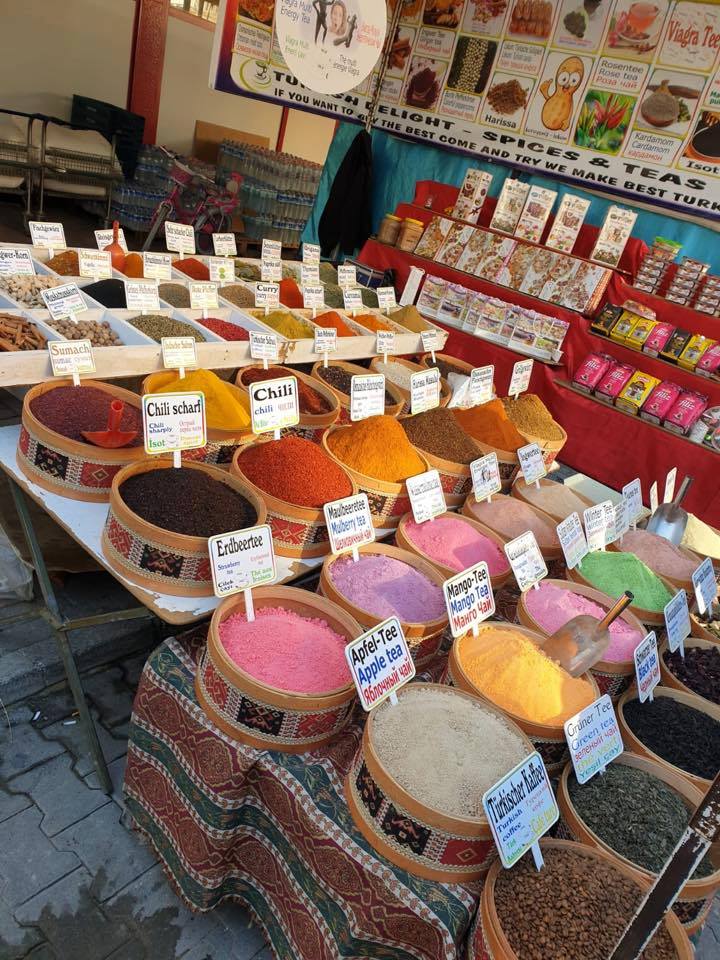
Workshops and lectures, also as quizzes, made the participant even more aware of the currently huge problem of plastic pollution and inspired the students to continue with the wave of positive changes in their local communities, as well as worldwide, by using the power of the Internet and social media.
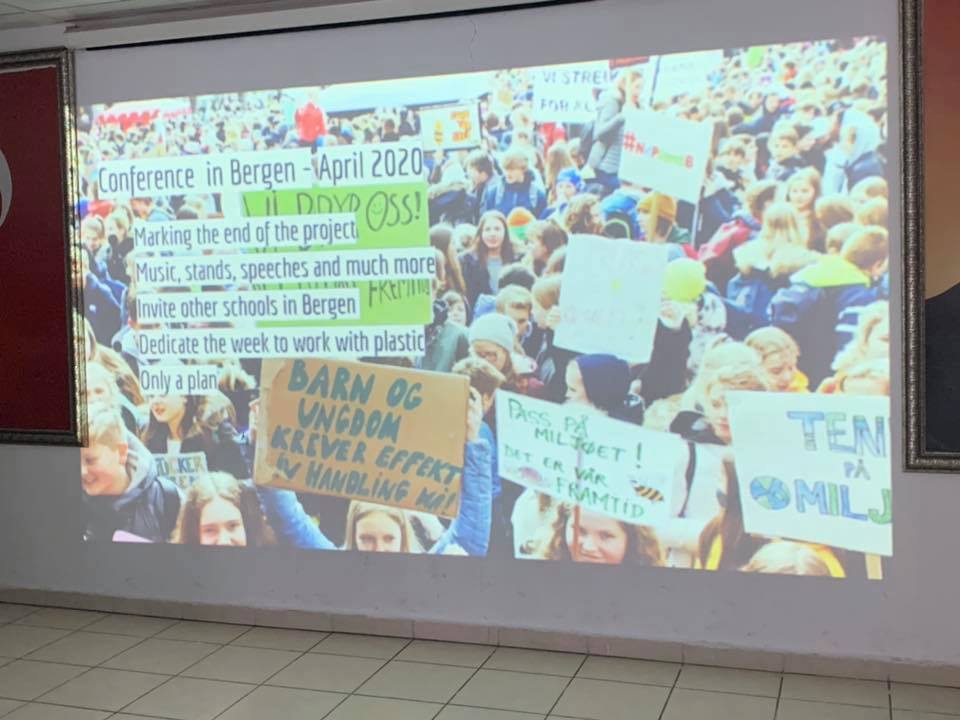
Also, there was time for visiting a mosque with four towers in Manavgat, exploring the ancient port city Side (2nd-century Antique Theater, Apollon Temple, museum) and a boat ride. In addition to the activities related to plastic pollution, the days were filled with culture and nature sightseeing which left no one indifferent.
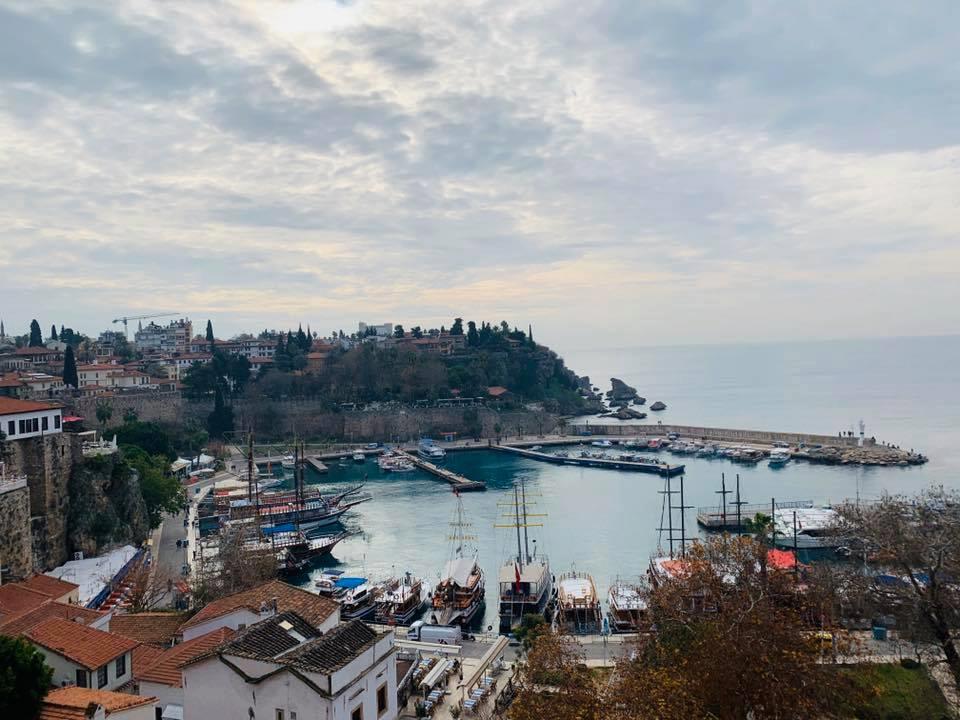
A day before going home, the delegation visited Antalya, which is often called one of the most beautiful cities on the Turkish riviera. The participants walked through the old city and enjoyed the streets full of restaurants, souvenir shops and small hotels, which are situated in the old houses previously used as residences. During the visit to Mevlevihane museum, the students learned that the origin of the spinning ritual (also called sema) is attributed to a widely revered holy man called Rumi, who preached inclusivity, tolerance, love and respect for all, regardless of their religion. The trip finished in a magical way, as the delegation saw the end of Düden Falls which drops off a rocky cliff directly into the Mediterranean Sea.
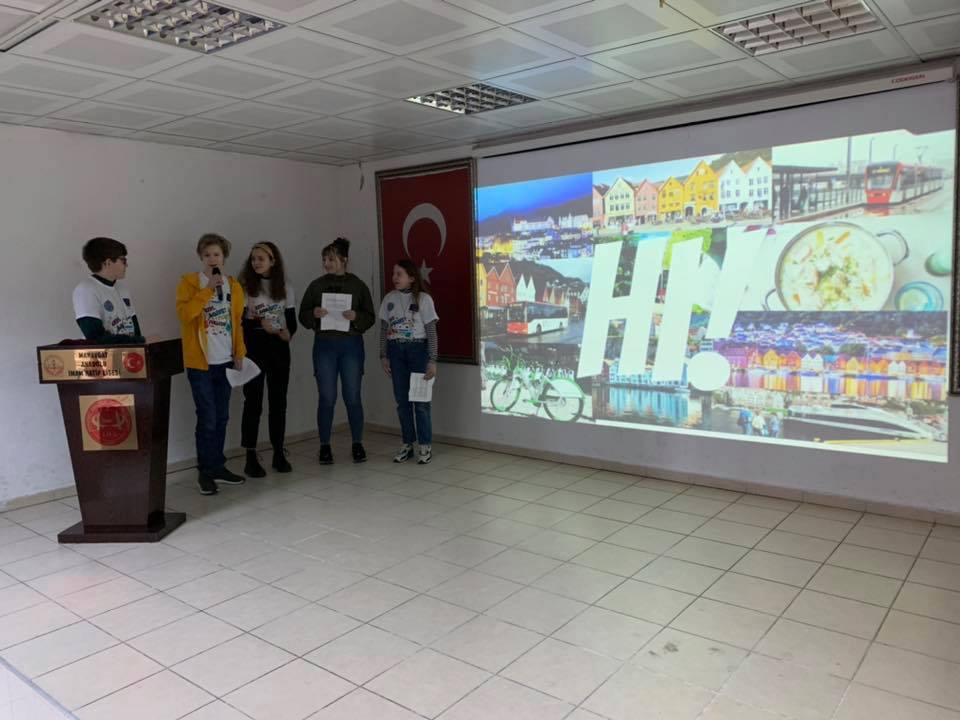
The students did not only get to experience their first flight by plane, but also got to live with Turkish host families. The students got to meet the Turkish way of life first hand, including their customs, but also felt their huge hospitality.
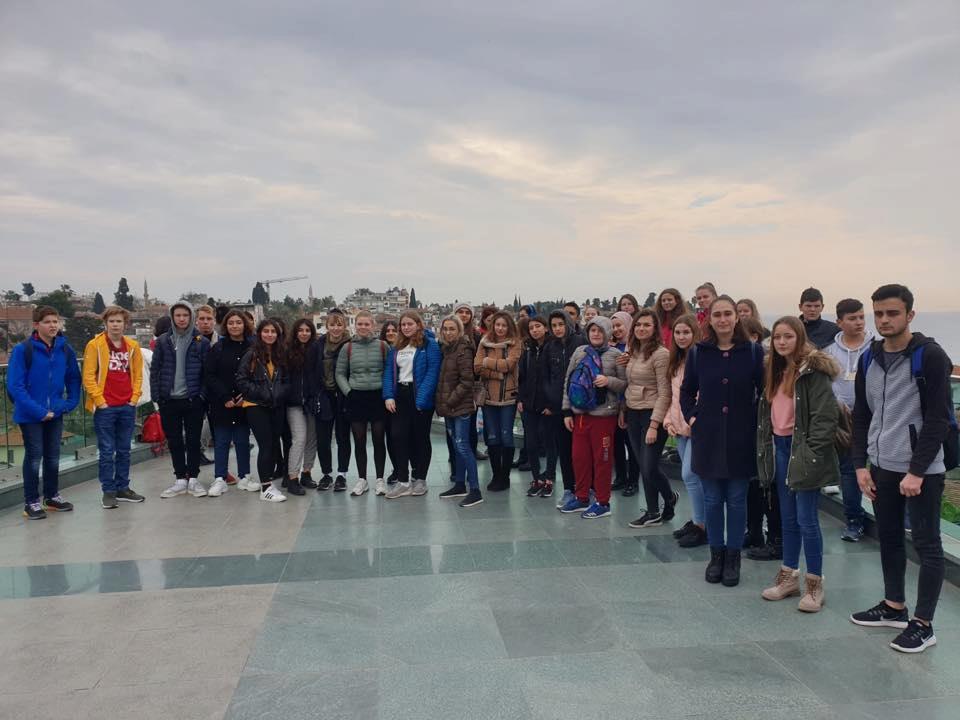
„Since I live in a Christian family, for the first time I saw how it is to live with Muslims and I had the chance to see their way of life. In the house of the boy Erdem I felt very comfortable, and his parents gave the Norweigan boy Vegard and me a warm place to stay,“ said fifth-grade Croatian student, Dorian. He added: „Also, I learned how many years are needed to degrade some plastic products and what each of us can do for a better world without plastic. By learning and having fun with new friends, also I managed to fall in love.“
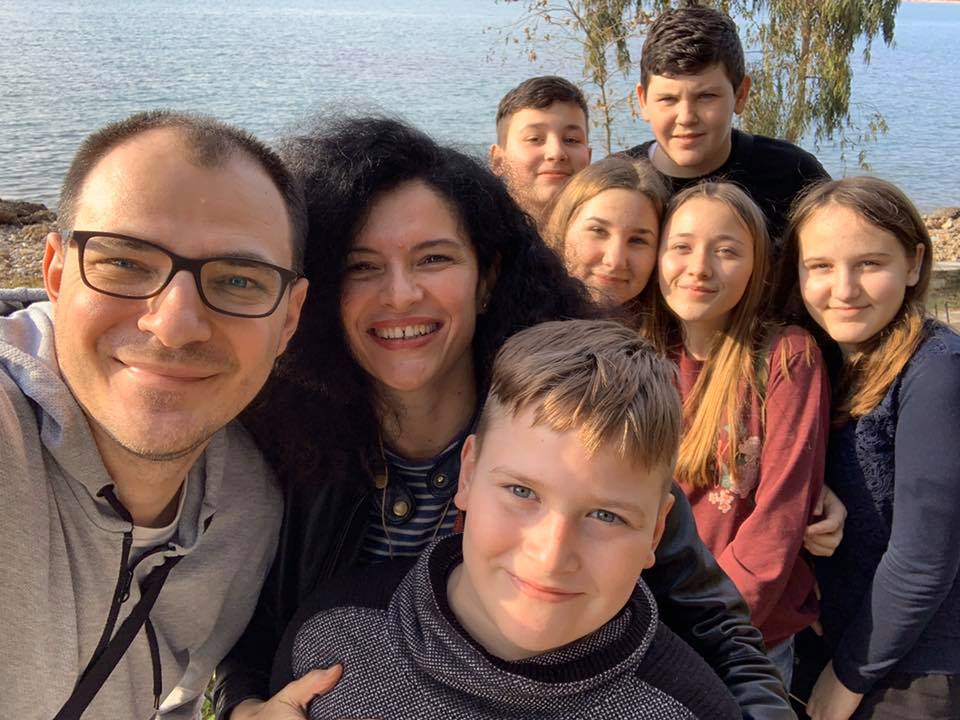
"Being in Turkey with this project was a wonderful experience. We were received with kindness and warmth by our host families, who showed us nothing but hospitality and love. It was a very eye-opening experience, since we visited a water plant where plastic is gathered so that it doesn't end up in the sea. And the figures were shocking: around 3 tonnes of plastic end up daily at the plant, only from the hotels' area. We also drew posters and cleaned up the beach in Manavgat, in order to get a little bit closer to our goal and be an example for the locals. But while dealing with plastic related issues, we also found time to have a great deal of fun. We visited ancient ruins, went on a boat trip, played games, learned traditional dances and let's not forget one of the most important parts: We loved Turkish food," said 16-year-old Romanian student Ana-Maria Avram.
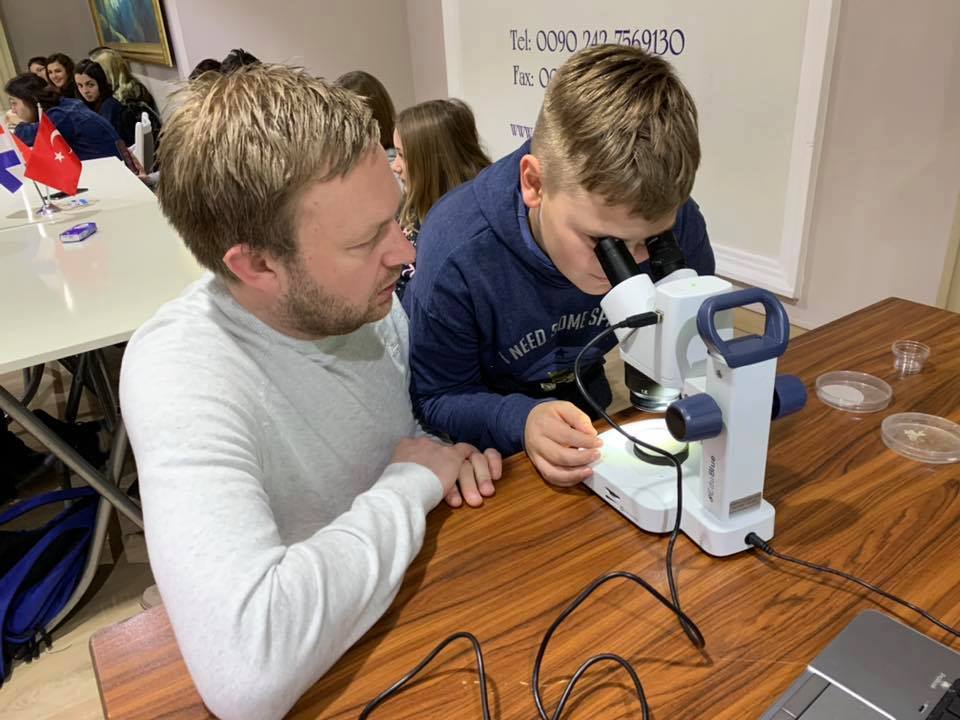
„I feel sorry for everyone not being here to experience what we have been through“, said the 15-year-old Norwegian student Anna Bakke. She could not stop talking about her fantastic host-family who took her with them to visit their whole family, showing her Turkish customs and giving her the experience of a lifetime. Throughout the week, she and the other students from Bergen, had through the different activities learned more in a week than most pupils do during a whole school year. About culture, plastic-pollution and how we can prevent it, in addition to getting new friends and learning something about themselves.

Since the way back home was long enough, there was plenty of time for making new plans for the upcoming mobility in Bergen and Odda, with the main accent on a very important conference where some of the results of the project will be presented.
The Croatian students came back to Baranja on the 18th of January 2020, and their satisfaction suggests that the program of this mobility was quite a success.
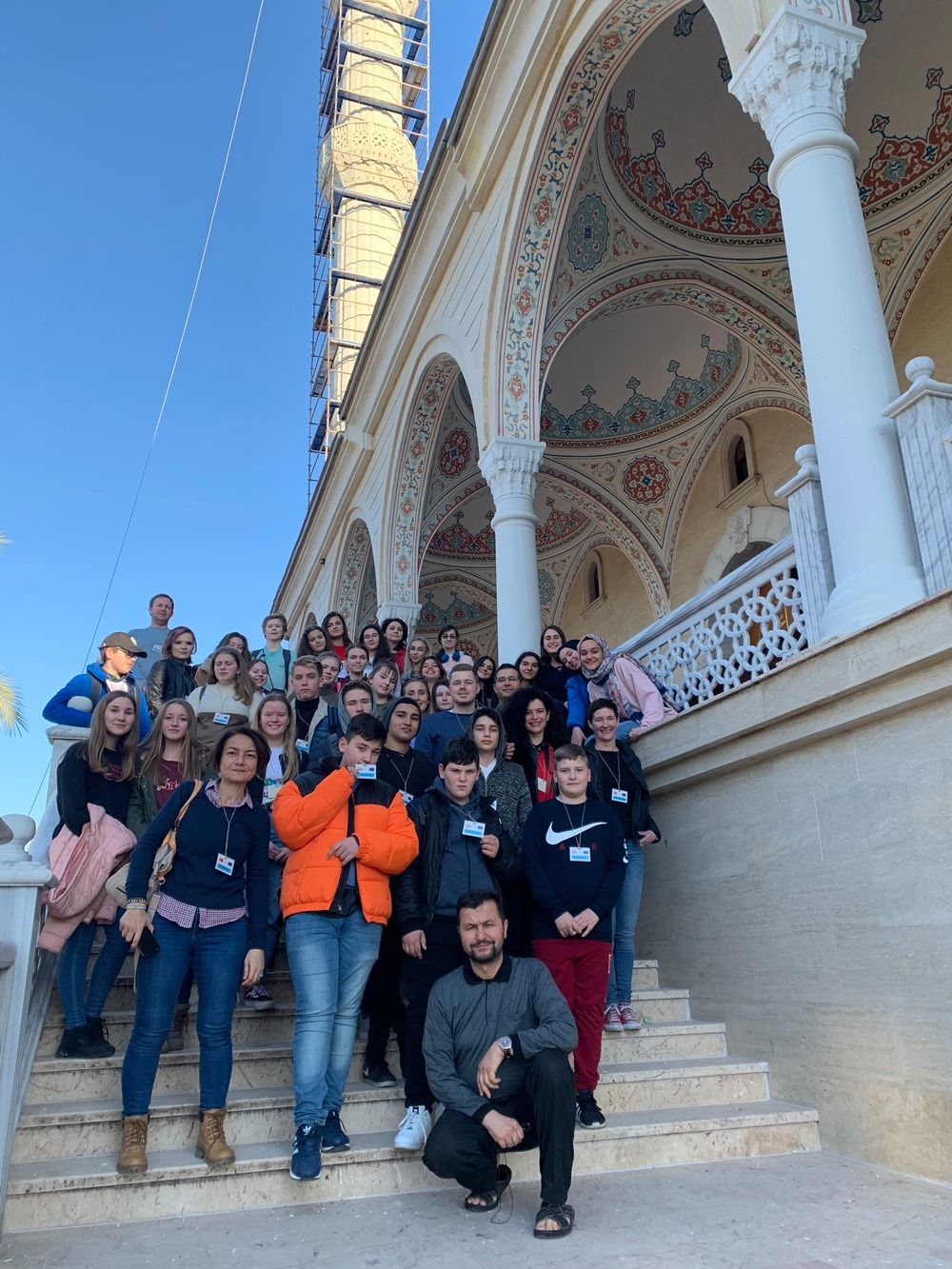
All the project activities, which are financially supported by the Agency for mobility and European union programme, can be followed on the official Facebook and Instagram page „Kids Against Plastic Pollution“.
You can follow the latest from Popovac school on Facebook.
Croatia Border Patrol Tracking Migrants With Portable Thermal Imaging
During the 2015 migrant crisis, Hungary and Slovenia built border barriers to thwart the influx of illegal migrants. Until recently, Croatia border guards have faced the daunting task of manually monitoring their unfenced 1,326 km border, which is also a non-Schengen EU border. However, with the help of advanced thermal imaging technology, Croatian border guards have finally gained an edge on stopping illegal migrant movement.
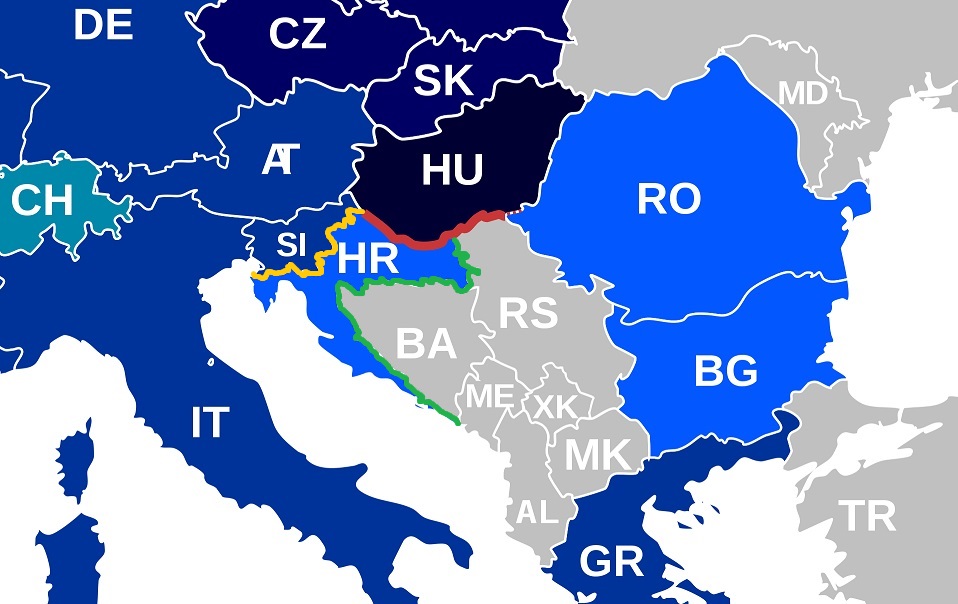
Hungary Border Fence (Red) | Slovenia Border Fence (Gold) | Croatia Border No Fence (Green) | Wikipedia
Unfenced Croatia EU Border 1,326 Kilometers Long
The Hungarian border barrier, which spans the borders of Serbia and Croatia, is 523 km long. The Slovenian border with Croatia spans 670 km. By contrast, Croatia shares a combined 1,326 km unfenced border with Bosnia and Serbia (1009 km with Bosnia, 317 km with Serbia). And migrants, many of whom are biding their time in nearby border camps, make repeated and daily attempts to enter Croatia from both countries, a practice which they call "The Game".
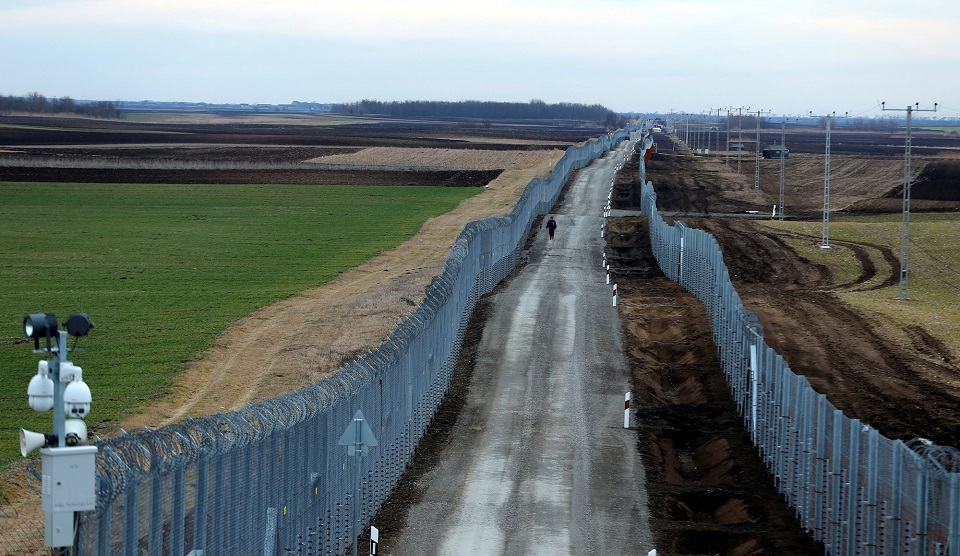
Hungary Border Fence | Wikimedia Commons
Electrified Hungarian Border Barrier Stopped Illegal Migration
Once completed in 2015, the Hungarian border barrier effectively halted migration into that country. It is equipped with parallel barbed-wire fences, floodlights, security cameras, and loudspeakers which blare warnings in English, Arabic and Farsi. The fences also deliver a mild electric shock upon contact, and have rendered any potential accusations of migrant pushbacks a moot point.
The Slovenian border barrier, while not as advanced, has also deterred attempts by migrants to enter Croatia’s Northwest neighbor. Both fences have effectively left many migrants, who are seeking entry into the Schengen zone, stranded in Croatia. While trapped in Croatia, they work with smugglers or attempt to continue their journey to Italy, Germany and France on their own.
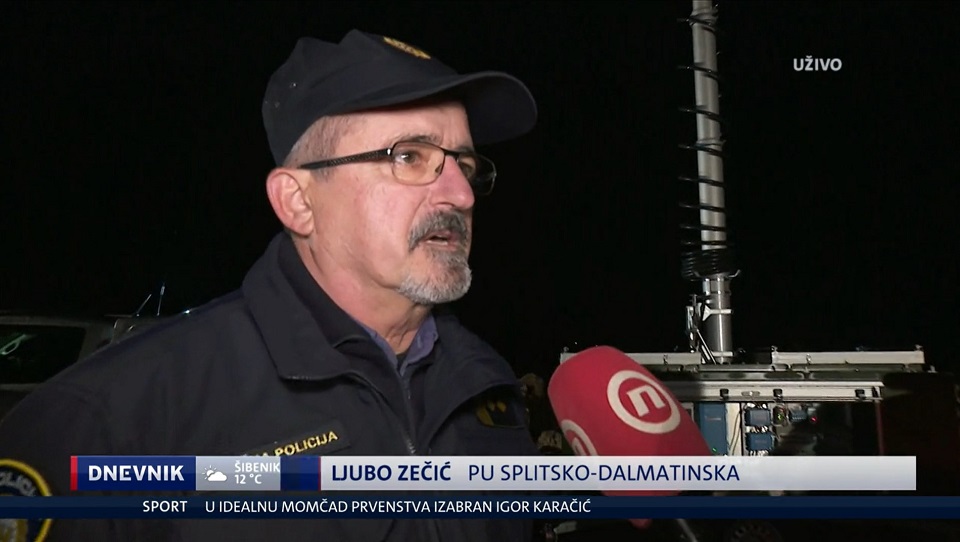
Croatia Begins Using Mobile Thermal Imaging Cameras
The Croatian border is now being protected by mobile thermal imaging cameras which can detect people illegally trying to enter Croatia from up to distance of several kilometers. The Nova TV/Dnevnik news team went to the border on January 26, 2020 and was the first to see how the 6 million EUR system works in practice.
Croatian police departments located on the illegal migrant route and roads leading to Croatia have been equipped with 17 Flir mobile camera systems.
Ljubo Zečić of the Splitsko Dalmatinska County Police Administration said that there are two devices are in their jurisdiction and indicated that it is very helpful that the system is mobile and can be easily transferred to positions which have been detected as frequent crossings.
Most Migrants Enter Croatia From Sarajevo and Mostar
"Most migrants coming from Bosnia are attempting to enter Splitsko Dalmatinska County from Sarajevo and Mostar. In 2019, our police department reported a 30 percent increase in illegal migrants and a 54 percent increase in smugglers," Zečić said.
Tomislav Poljak from the Trilj station demonstates the Flir thermal imaging device, which has already thwarted the plans of numerous migrants and smugglers to enter Croatia illegally.
"Our colleagues are walking about two and a half kilometers from us, and we can detect exactly what is happening at that distance with this device," explains Poljak.
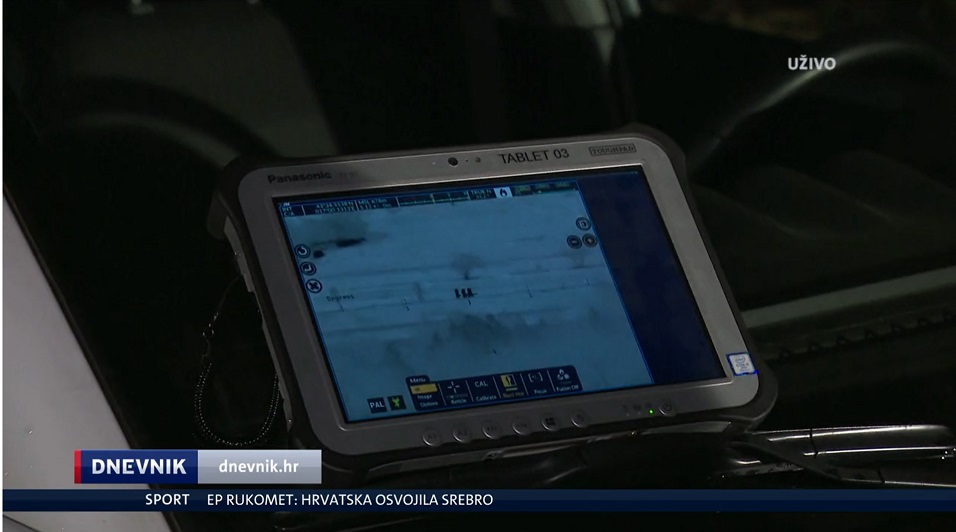
Migrant Cell Phones Permit Communication and Coordination
As soon as Tomislav's work shift began, he noticed some suspicious activity on the border. It was likely that someone was attempting to enter Croatia on a gravel road, which is often used by migrants going to Sinj. The nearest border control team was immediately dispatched to the field.
"A lot of migrants have very good cell phones and are quite well informed. And nowadays, they use temporary sim cards with these cell phones. They always have another trick up their sleeves,” Tomislav points out.
Cameras Detect Migrant Movement Across Bosnia Border
Almost a kilometer above sea level, the police officers found an abandoned truck which migrants often us to seek shelter from bad weather. Since there was no one in the truck, the Trilj border guards continued their search with manual thermal imaging devices.
"Without this technology, it would be much harder to do our job because you cannot see anything in the dark with human eyes," Zdenko explains.
The police action was soon abandoned because the suspect returned to Bosnia and Herzegovina.
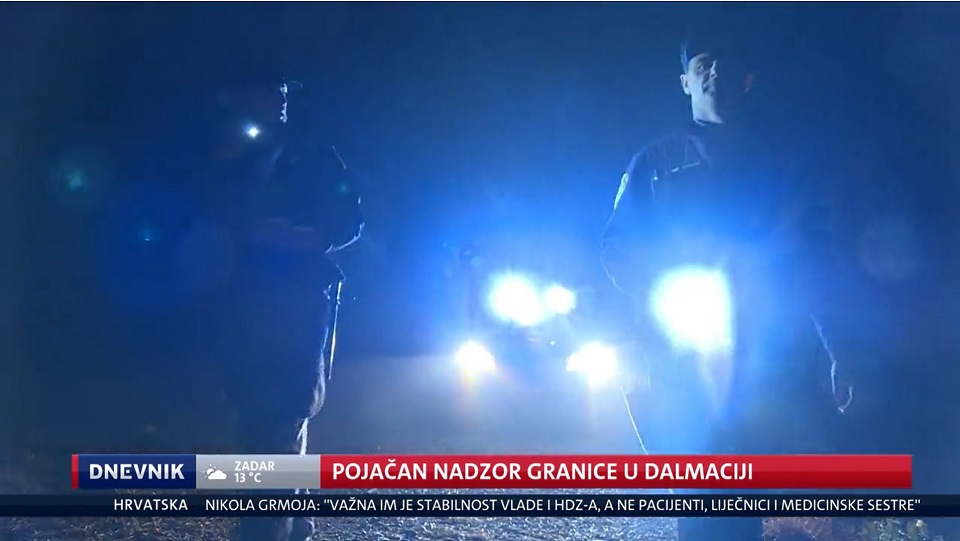
Cameras Can Be Moved Within 20 Minutes
The benefits of these devices are numerous. "If we need to move it to another location quickly, it takes us maybe 15-20 minutes to pack it up and drop it off," Tomislav says.
The cost of one Flir thermal imaging camera is almost 2.7 million HRK (362,789 EUR). If you approach it; the device automatically notifies police officers on the ground and issues a verbal warning. With the help of this technology, police believe that they will finally be able to stay a step ahead of smugglers and people trying to enter Croatia illegally.
Follow our Politics page to keep track of the migrant crisis in Croatia and efforts to control illegal border movement.
Brits in Croatia: Can Brits Still Move to Croatia After Brexit Day?
January the 27th, 2020 - On the 31st of January, 2020, the United Kingdom of Great Britain and Northern Ireland left the European Union after over forty years of membership. For some, on both sides of the English channel, Britain's departure is a joyous event, and for others - a time of deep sadness. Emotions aside, let's look at the practicalities for Brits in Croatia.
I've covered the Brexit saga from day one when it comes to Brits in Croatia and what it means for their residence rights, their driving licenses, their access the labour market and to health care in Croatia after Brexit and much more.
We've looked in depth at what Brexit with a deal means for Brits in Croatia, and what a potential no deal Brexit means for Brits in Croatia. Several articles have been written in an attempt to provide the best information possible for Croatia's resident Brits, and many emails back and forth with MUP and the EU have allowed us to bring you the clarity you need.
Long story short, all Brits in Croatia who have been living here legally under EU law (in this case freedom of movement) and have the residence documents (either temporary or permanent residence) to prove it, are entitled to stay regardless of the outcome of the Brexit negotiations, meaning that whether Boris Johnson manages to strike a deal or not - British citizens with valid residence permits are entitled to stay and will be protected either under the Withdrawal Agreement or by Article 75 of the Croatian Law on EEA nationals and their family members.
JARGON BUSTER:
Withdrawal Agreement/Orderly Brexit - Brits in Croatia are protected by the Withdrawal Agreement and Croats in the UK are too, but they must still apply for Settled status before June 2021.
No deal Brexit after December 2020 (or later if the transition period is extended) - Brits in Croatia are protected by Article 75 of the law on EEA nationals and their family members and Croats are protected unilaterally by the UK by applying for Settled status (the equivalent of permanent residence/Indefinite Leave to Remain).
Now that things are clear for Brits already living in Croatia and indeed Croats already living in the UK, what about those planning to make the move but won't be able to do so before Brexit day on the 31st of January?
Because the UK's Withdrawal Agreement has been ratified, the eleven months of the UK's transition (implementation) period will begin on the 1st of February, 2020. During the transition, nothing will change for travellers. British passport holders can still freely use the EU lines at EU airports and the EHIC (European Health Insurance Card) remains valid.
British nationals will not need any type of visa to go to the EU or to enter Schengen even after the transition period ends.
This eleven month period will continue until December 2020, and will potentially be extended after that. During this period, Brits who want to make the move to Croatia, or indeed to any other EEA country, are more than entitled to do so under European Union law which will still apply to the UK throughout the transition period. The same is true for Croats or indeed any other EU citizen who wants to make the move to Britain during these eleven (and potentially more) months.
What will my post Brexit rights be if I move to Croatia during the transition period? Will they differ from the rights afforded to those who made the move before that?
Your rights will be the same as those of EU citizens, this includes British citizens already living in Croatia. You have the right to move, reside, and register your temporary residence under EU rules in Croatia. In short, no, your rights will not be any different to those who moved to Croatia before Brexit day.
You can find out more about how to apply for residence here (scroll down to the rules for EEA citizens).
Why is the transition period only eleven months long?
Because of the repeated extensions to Brexit, which was originally meant to happen two years after Article 50 was invoked and occur back in March 2019, the transition period will now only be a measly eleven months long.
What about when the transition period ends, either in December 2020 or later on?
When the transition period ends, things will become more difficult for Brits to move to Croatia or elsewhere in the EEA. The British Government wants to end freedom of movement, so unless some other sort of bespoke agreement is reached, the right to simply come and reside in Croatia is likely to alter.
A lot of what will happen after the end of the transition period is complete guesswork at this moment in time as many decisions on the UK's future relationship with the EU will be decided during the next eleven (or more) months. However, Brits who do decide to move to Croatia after the transition period in which all EU law continues to apply to the UK ends, will be treated as third country nationals.
What does that mean?
Third country nationals are nationals from outside of the EEA. These people can non-Europeans such as American, Australian or Canadian citizens, or they can be other Europeans from outside of the EEA, such as Ukrainians, Belarusians or Macedonians.
Gaining residence in Croatia is notoriously hard for them. Keeping hold of it is also difficult as third country nationals are afforded much less freedom when it comes to travel outside of Croatian borders. EU citizens can be out of the country for six months per year without it affecting their residence. Third country nationals must have a good reason if they want to be out for more than 30 days in a row or risk the termination of their permits. The list of ''cons'' for third country nationals is very long. You will absolutely still be able to move here, but it will not be a right governed by EU law and you will face ridiculous hurdles and additional costs.
If I apply for residence during the transition period, what rights will I be granted and have protected?
You will be able to apply under much easier EU rules.
You will have free access to the Croatian labour market and you will not need a work permit.
You will be able to be self employed.
Your right to live and work in Croatia will be protected by the authorities.
You will be able to apply for permanent residence under the same rules in five years.
Once you secure permanent residence in Croatia, you can be out of the country for as long as five years in a row without losing it. Unlike other EEA citizens, who can only be out for two years in a row.
These are what are often known as acquired rights and most importantly of all - you will not be treated as a third country national.
OUR ADVICE:
If you want to move to Croatia and you're a British national, do so before the end of December 2020 to be treated as an EU citizen and be protected by the Withdrawal Agreement or by Article 75 in Croatian law.
If you already live in Croatia and for some reason or another haven't registered your temporary residence - do so now.
If you already live in Croatia and have done for five years with legal, uninterrupted temporary residence (absences of six months per year are allowed) apply for your permanent residence permit now.
A list of useful links from TCN:
(Please note that some of the names, such as former PM Theresa May, and former Brexit dates that never happened may be included in the links provided below. Ignore them but understand that all of the information remains relevant)
What the Withdrawal Agreement means for Brits in Croatia and Croats in the UK
Brexit Brits in Croatia - Simplified jargon for Croatia's British residents
Brexit Brits in Croatia - MUP's guidelines in the event of any scenario
Brits in Croatia - How Croatia will protect your rights deal or no deal (latest article with the newest info!)
A useful link from MUP:
Information concerning the future relations between the UK and the EU
Follow our politics page for more on Brexit.
HDZ MP Pleads Not Guilty to Attempted Bribery of Reporter
ZAGREB, January 27, 2020 - An MP of the ruling Croatian Democratic Union (HDZ) party, Franjo Lučić, pleaded not guilty to the charges of attempted bribery of Drago Hedl, a reporter for the Telegram news website, at the start of his trial before the County Court in the eastern city of Osijek on Monday.
The hearing opened with the prosecution presenting its evidence - an audio recording of a conversation between Lučić and Hedl.
Lučić was originally indicted by the USKOK anti-corruption office in March 2018 on suspicion of attempting to bribe Hedl in 2017 when he asked Hedl not to publish an article based on information the reporter had obtained about Lučić's and his companies' financial transactions, claiming that the article would harm him as a lawmaker and businessman.
Lučić was charged with trying to persuade Hedl not to publish his article and offering to pay him three times the amount the reporter would have earned from the article from his media organisation.
The next hearing was set for March 25.
The indictment against Lučić was upheld in November 2019 after Osijek County Court did not confirm it in May because the trial chamber suspended the hearing after deciding to remove a transcript of the conversation between Lučić and Hedl as inadmissible.
The Supreme Court upheld a complaint by USKOK and subsequently admitted the private audio recording of the conversation between Hedl and Lučić.
More politics news can be found in the Politics section.
Plenković: Liberation of Auschwitz Marked End of Darkest Chapter in History
ZAGREB, January 27, 2020 - The liberation of the Auschwitz death camp marked the end of the darkest chapter in history, and educating young people about the Holocaust is key to building a society in which something like that will never happen again, Croatian Prime Minister Andrej Plenković said on Monday.
"The liberation of the camp in which over a million people were killed marked the end of the darkest chapter in European and world history," Plenković told Hina on arriving in Poland to participate, along with over 20 heads of state and government, in the commemoration of the 75th anniversary of the liberation of the Auschwitz-Birkenau concentration camp.
"Awareness and education of young people about historical atrocities, particularly about the Holocaust, is key so that present and future generations can build a society in which there is no room for exclusion, intolerance and violence," Plenković said.
"The unspeakable pain of Auschwitz and many other Nazi camps commits us to strongly resist any such attempts and all forms of discrimination and hatred, and to advocate the values of peace, tolerance and dialogue," he added.
The main memorial ceremony is taking place near the entrance to the Birkenau camp, known as the Gate of Death. It will be addressed by Polish President Andrzej Duda and some of the camp survivors. The head of delegations, including Plenković, will light candles at the monument there.
More news about the Holocaust can be found in the Politics section.
Training for Border Police Starts in Valbandon
ZAGREB, January 27, 2020 - A training course for 18 border police, including police officers from countries of the so-called Western Balkans migrant route – Albania, North Macedonia, Kosovo, Serbia, Montenegro, and Bosnia and Herzegovina, started in Valbandon on Monday.
The training is being conducted by the Croatian Ministry of the Interior Police Academy, in cooperation with the German Police Academy as a partner in the project, and with the financial and technical assistance of Frontex.
This is the first time the project includes police officers from third countries, primarily those along the Western Balkans migrant route.
"Considering that the Western Balkans route continues to be one of the most attractive migrant routes for illegal entry to the European Union, it is essential to strengthen the preparedness and capacity of all border police forces in EU member countries and non-member countries, with special focus on the protection of human rights and treatment of vulnerable groups," Zagreb Police Academy assistant director Mirjana Abramović said.
She added that the Valbandon practical training course would introduce its 18 participants to European legislation and procedures and ways of protecting the European Union's external border.
The training is based on practical exercises and training sessions, to be conducted by experts for border supervision and human rights protection.
"As of tomorrow, they will work together in teams and go out into the field. The scenarios have been prepared and after each case they will have to prepare an operative report in accordance with Frontex procedures," Abramović underscored and added that the project was strengthening the Interior Ministry's educational role in the region while the Police Academy was strengthening its international relations with partners in the region, particularly German federal police.
More news about the migrant crisis can be found in the Politics section.
Rudjer Boskovic Institute: Innovative Protocol in Fluorescent Labelling of Proteins
New protocol by Croatian scientists has strong commercial potential. The research team hopes to join forces with industry partner to successfully complete the commercialization of their innovation.
ZAGREB, CROATIA, 27 Jan 2020 - A multidisciplinary team of scientists at the Rudjer Boskovic Institute (RBI) in Zagreb, Croatia, has developed a novel protocol in fluorescent labelling of proteins based on unusual photochemical reactivity. The innovative and commercial potential of the new protocol is further backed by the pending patent application in the EU and the USA, whereas a part of the research has been published in one of the leading journals in the field 'ACS Applied Materials & Interfaces'
The latest results are a successful outcome of a synergy of theoretical and experimental research by Croatian scientists in the fields of organic synthesis, photochemistry and biology, as well as a fruitful collaboration with Professors Cornelia Bohne and Peter Wan from the University of Victoria in Canada.
The Croatian team of chemists involving Katarina Zlatic, Dr Ivana Antol and Dr Nikola Basaric from the RBI Department of Organic Chemistry and Biochemistry and a team of biologists Dr Lidija Uzelac, Dr Ana-Matea Mikecin Drazic and Dr Marijeta Kralj from the RBI Division of Molecular Medicine have been working on the development of new dyes for the use in phototherapy of cancer for almost a decade.
The team has already filed a patent application for the new protocol, and they are looking for a potential partner in pharma, as well as companies and SMEs interested in applications of fluorescent technologies in biology to commercialize the invention.
''Our team has been working very hard on the development of new agents for the photochemical treatment of cancer, particularly for the past four years within the project funded by the Croatian Science Foundation.
Our new protocol is not based on the "photosensitization" and production of reactive singlet oxygen species, which is currently the major mechanism of photochemical anticancer treatment used in clinics. Instead, the new protocol works on the photochemical transformation of a non-harmful dye into a very reactive species 'quinone methide' which reacts with different intracellular molecules and is responsible for the cell death,'' explains Dr Nikola Basaric, the Head of the RBI Laboratory of Synthetic Organic Chemistry and HrZZ project manager.
''Since the treatment does not rely on the presence of dissolved oxygen in cells, which are often present at a very low concentration in cancer cells - the effect known as hypoxia, it represents a highly promising alternative in photochemical anticancer treatment. The selectivity of the method and minimization of the treatment side effects should be assured by selective excitation of the dye localized in the cancer tissue only, for example by use of fibre optics,'' says Dr Basaric.
Among different classes of synthesized dyes, some molecules are highly bright and fluorescent, as well as photochemically stable, if excited by visible light. In these cases, molecules can be used as fluorescent dyes for in vitro cellular images by fluorescent microscopy.
Although molecules are photochemically stable if they are excited by visible light, their photochemical reactivity can be turned on by use of UV-light. Upon excitation with UV-light, very reactive 'higher excited singlet states' are formed which undergo ultrafast reactions and deliver the reactive species 'quinone methides'.
These quinone methides can covalently attach to proteins and allow for their visualization by fluorescence spectroscopy. The demonstration of this unusual protocol and its applicability was recognized and accepted for the publication in one of the top journals in the field from the American Chemical Society.
''We will continue our endeavours on the development of photochemically reactive dyes which can be used in anticancer therapy as well as fluorescent dyes for labelling of biomolecules. This research is planned within the scope of newly granted project by the Croatian Science Foundation, and hopefully, soon we expect to join forces with industry partner to successfully complete the commercialization of our research,'' concludes Dr Basaric.
Croatia's EU Presidency Important for Reaching Agreement on MFF
ZAGREB, January 27, 2020 - The coming months are crucial for reaching an agreement on the multiannual financial framework (MFF) for 2021-2027, which is why Croatia's presidency over the Council of the European Union is of utmost importance, it was said on Monday after the meeting of representative of the European Parliament's Committee on Budgets (BUDG) and Prime Minister Andrej Plenković.
Finance Minister Zdravko Marić said after the meeting in Government House that the biggest focus of Croatia's presidency, apart from the four priorities, was the process of the multiannual financial framework (MFF).
He underscores that the main part of the job is in the hands of the European Council and its president Charles Michel, who is in charge of reaching a compromise on the MFF, and who, with the aim of continuing the dialogue, convened an extraordinary summit with heads of state and governments for 20 February.
Regardless of the outcome of that or any other meeting, Croatia as the country presiding over the Council of the EU is ready to continue the dialogue with both the European Commission and the European Parliament, says Marić.
Once we have the political or negotiating framework, there are a whole series of sectoral proposals, more precisely 45 of them, which are part of the whole package and an integral part of our dialogue, adds the Finance Minister. He also praised the information exchange with the BUDG.
"The entire team behind Croatia's presidency is ready to continue talks and in the end we all hope for the successful completion of the work ahead of us," said Marić, pointing out that reaching a compromise is considered as a success.
"We will see how good and quality the compromise will be, however, all us will consider it a success to finish the process within this year and to have a fully functioning MFF so that we can go to the next stages, which are yearly budgets," said the minister.
He also said that the idea and the intent was to make a budgetary framework that would be both realistic and efficient enough to meet all the needs and priorities of the EU and its citizens.
Chairman of the BUDG, Johan Van Overtveldt of the European Conservatives and Reformists Group said after his meeting with Marić that the coming weeks and months would be crucial as this was the time framework for reaching an agreement on the MFF for the 2021-2027 period.
It is also therefore that the Croatian presidency is of the utmost importance, said this member of the European parliament who is also the head of the negotiating team for the new MFF.
As for Brexit, Overtveldt said that this was also a complex and important issue in the negotiations about the new MFF considering the fact that Great Britain was a net contributor to the EU budget and its exit means less money in the bloc's purse.
In the coming period, constructive solutions must be found so as to adequately respond to that aspect of Brexit with the European budget serving citizens of the EU in a satisfactory manner.
Considering the negotiations on the MFF, there are four positions which should be brought closer.
The Commission has proposed a budget equivalent to around 1.11% of the gross national income (GNI) of the future Union of 27 Member States.
Member-states that are net contributors insist on 1 percent of GNI, whereas the 17 countries in the informal group called Friends of Cohesion, which are net recipients, propose that the outlays for agriculture and cohesion should be kept at the same level, the maintenance of the current shares of the national payments in the EU co-funded projects and the maintenance of the current duration for the implementation of such projects.
The European Parliament adopted a position on the MFF in November 2018 which reads that 1.3% of GNI should serve as an equivalent for the budget, so that all the promises can be delivered regarding fighting climate change, research and innovation programmes, regional policy and social rights.
More news about Croatia and the EU can be found in the Politics section.
President-Elect Milanović Says Inauguration Will Be Dignified
ZAGREB, January 27, 2020 - President-elect Zoran Milanović on Monday said that the presidential inauguration would be "decent and dignified."
The presidential inauguration will be held on February 18 in the President's Palace on Pantovčak Hill, he said and added that it will be "decent and dignified."
"Tradition has to exist but I have decided for this. I have said what the criteria are and I hope no one will be offended," he said.
Asked whether the former director of the SOA Security Intelligence Agency Dragan Lozančić has agreed to be one of his advisers, Milanović said that talks on that were still under way.
"An adviser for national security has to exist because he is the only one, who in some way is mandatory by law because he represents the president in a particular institution. Other matters are an indicator of preference and the president's aspirations," he said and added that he would not have an adviser for social activities because that is not in his remit.
He added that there would not be many advisers in the Office of the President, not for the sake of austerity but that he "does not want to compete with the government in every segment of its authority and have advisers for all of the government's departments."
President-elect Zoran Milanović on Monday said that there has been too many scandals over the past two years with officials incorrectly completing their Declaration of Assets, so that this is not just a matter related to Health Minister Milan Kujundžić and his assets, said Milanović.
"There has been too much of that in the past two years, I'm not thinking of Kujundžić, there's just been too much. The government will have my support however the government has to be a political body comprising people who have some political clout, reputation, status, influence in the political organisation that has nominated them where they are. If the government is too technical, then it has a problem," said Milanović after testifying at Zagreb County Court in the "travel allowance" scandal.
This is not just a matter concerning Kujundžić but an entire series of officials who complete their declaration of assets incorrectly and it is interesting that they always report that they have less assets than they truly own.
Milanovic noted that that system is a lot more flexible in the European Parliament and less rigorous because there MEPs just have to sign a statement of the interests they may have. He believes that the system in Croatia has existed long enough for people to have become accustomed to it and in his opinion, it should be even more rigorous.
The statement was given by Milanović before he entered Zagreb County Court where he is supposed to testify in the trial dubbed travel allowance scam in which Tomislav Saucha, who was Milanovic's chief of staff during his premiership, and his secretary, Sandra Zeljko, are indicted for forgery of travel expenses documents.
More news about Zoran Milanović can be found in the Politics section.

